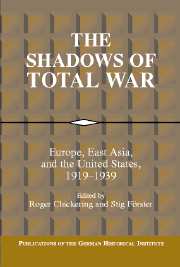Book contents
- Frontmatter
- Introduction
- Part One Reflections on the Interwar Period
- Part Two Legacies of the Great War
- Part Three Visions of the Next War
- 8 Sore Loser: Ludendorff’s Total War
- 9 Strangelove, or How Ernst Jünger Learned to Love Total War
- 10 Shadows of Total War in French and British Military Journals, 1918-1939
- 11 Yesterday’s Battles and Future War: The German Official Military History, 1918-1939
- 12 “The Study of the Distant Past Is Futile”: American Reflections on New Military Frontiers
- Part Four Projections and Practice
- Index
11 - Yesterday’s Battles and Future War: The German Official Military History, 1918-1939
Published online by Cambridge University Press: 05 January 2013
- Frontmatter
- Introduction
- Part One Reflections on the Interwar Period
- Part Two Legacies of the Great War
- Part Three Visions of the Next War
- 8 Sore Loser: Ludendorff’s Total War
- 9 Strangelove, or How Ernst Jünger Learned to Love Total War
- 10 Shadows of Total War in French and British Military Journals, 1918-1939
- 11 Yesterday’s Battles and Future War: The German Official Military History, 1918-1939
- 12 “The Study of the Distant Past Is Futile”: American Reflections on New Military Frontiers
- Part Four Projections and Practice
- Index
Summary
At the end of July 1943, at about the time that the strategic air war against Germany reached a new peak with the raids on Hamburg, Alfred von Wegerer, a member of the army's Military History Research Institute (Kriegsgeschichtliche Forschungsanstalt des Heeres), which had been given the responsibility to complete the German official military history of World War I, looked back on more than twenty years of work: “It seems necessary to me that we break with the old tradition of military history. . . . Instead of separate accounts of the history of operations and politics, we must - in the interest of a better understanding of the totality [Totalität] of war and its universal-historical consequences - find a way to comprehend the totality [Ganzheit] of war, in all its military and political aspects, as Clausewitz described it. In this way, we should reach a deeper understanding of the interrelationship and complementarity of politics and the conduct of war.” At the same time, however, his colleague Friedrich Solger complained about the same official history's want of practical applicability. “Having seen how fourteen bulky volumes on the First World War have served inadequately to prepare for the Second,” he wrote, “we must conclude that the approach was wrong.”
- Type
- Chapter
- Information
- The Shadows of Total WarEurope, East Asia, and the United States, 1919–1939, pp. 223 - 238Publisher: Cambridge University PressPrint publication year: 2003

